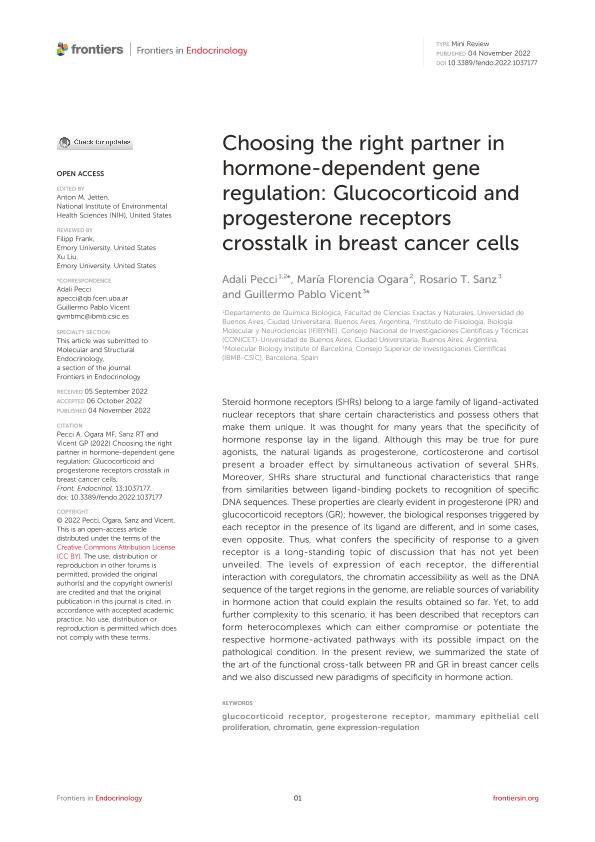Mostrar el registro sencillo del ítem
dc.contributor.author
Pecci, Adali

dc.contributor.author
Ogara, Maria Florencia

dc.contributor.author
Sanz, Rosario T.
dc.contributor.author
Vicent, Guillermo Pablo
dc.date.available
2023-08-29T16:06:21Z
dc.date.issued
2022-11
dc.identifier.citation
Pecci, Adali; Ogara, Maria Florencia; Sanz, Rosario T.; Vicent, Guillermo Pablo; Choosing the right partner in hormone-dependent gene regulation: Glucocorticoid and progesterone receptors crosstalk in breast cancer cells; Frontiers Media; Frontiers in Endocrinology; 13; 11-2022; 1-10
dc.identifier.issn
1664-2392
dc.identifier.uri
http://hdl.handle.net/11336/209776
dc.description.abstract
Steroid hormone receptors (SHRs) belong to a large family of ligand-activated nuclear receptors that share certain characteristics and possess others that make them unique. It was thought for many years that the specificity of hormone response lay in the ligand. Although this may be true for pure agonists, the natural ligands as progesterone, corticosterone and cortisol present a broader effect by simultaneous activation of several SHRs. Moreover, SHRs share structural and functional characteristics that range from similarities between ligand-binding pockets to recognition of specific DNA sequences. These properties are clearly evident in progesterone (PR) and glucocorticoid receptors (GR); however, the biological responses triggered by each receptor in the presence of its ligand are different, and in some cases, even opposite. Thus, what confers the specificity of response to a given receptor is a long-standing topic of discussion that has not yet been unveiled. The levels of expression of each receptor, the differential interaction with coregulators, the chromatin accessibility as well as the DNA sequence of the target regions in the genome, are reliable sources of variability in hormone action that could explain the results obtained so far. Yet, to add further complexity to this scenario, it has been described that receptors can form heterocomplexes which can either compromise or potentiate the respective hormone-activated pathways with its possible impact on the pathological condition. In the present review, we summarized the state of the art of the functional cross-talk between PR and GR in breast cancer cells and we also discussed new paradigms of specificity in hormone action.
dc.format
application/pdf
dc.language.iso
eng
dc.publisher
Frontiers Media

dc.rights
info:eu-repo/semantics/openAccess
dc.rights.uri
https://creativecommons.org/licenses/by/2.5/ar/
dc.subject
CHROMATIN
dc.subject
GENE EXPRESSION-REGULATION
dc.subject
GLUCOCORTICOID RECEPTOR
dc.subject
MAMMARY EPITHELIAL CELL PROLIFERATION
dc.subject
PROGESTERONE RECEPTOR
dc.subject.classification
Bioquímica y Biología Molecular

dc.subject.classification
Ciencias Biológicas

dc.subject.classification
CIENCIAS NATURALES Y EXACTAS

dc.title
Choosing the right partner in hormone-dependent gene regulation: Glucocorticoid and progesterone receptors crosstalk in breast cancer cells
dc.type
info:eu-repo/semantics/article
dc.type
info:ar-repo/semantics/artículo
dc.type
info:eu-repo/semantics/publishedVersion
dc.date.updated
2023-06-30T10:40:11Z
dc.journal.volume
13
dc.journal.pagination
1-10
dc.journal.pais
Suiza

dc.journal.ciudad
Lausana
dc.description.fil
Fil: Pecci, Adali. Consejo Nacional de Investigaciones Científicas y Técnicas. Oficina de Coordinación Administrativa Ciudad Universitaria. Instituto de Fisiología, Biología Molecular y Neurociencias. Universidad de Buenos Aires. Facultad de Ciencias Exactas y Naturales. Instituto de Fisiología, Biología Molecular y Neurociencias; Argentina. Universidad de Buenos Aires. Facultad de Ciencias Exactas y Naturales. Departamento de Química Biológica; Argentina
dc.description.fil
Fil: Ogara, Maria Florencia. Consejo Nacional de Investigaciones Científicas y Técnicas. Oficina de Coordinación Administrativa Ciudad Universitaria. Instituto de Fisiología, Biología Molecular y Neurociencias. Universidad de Buenos Aires. Facultad de Ciencias Exactas y Naturales. Instituto de Fisiología, Biología Molecular y Neurociencias; Argentina
dc.description.fil
Fil: Sanz, Rosario T.. Consejo Superior de Investigaciones Cientificas. Institut de Biologia Molecular de Barcelona (ibmb); España
dc.description.fil
Fil: Vicent, Guillermo Pablo. Consejo Superior de Investigaciones Cientificas. Institut de Biologia Molecular de Barcelona (ibmb); España
dc.journal.title
Frontiers in Endocrinology
dc.relation.alternativeid
info:eu-repo/semantics/altIdentifier/url/https://www.frontiersin.org/articles/10.3389/fendo.2022.1037177/full
dc.relation.alternativeid
info:eu-repo/semantics/altIdentifier/doi/https://doi.org/10.3389/fendo.2022.1037177
Archivos asociados
